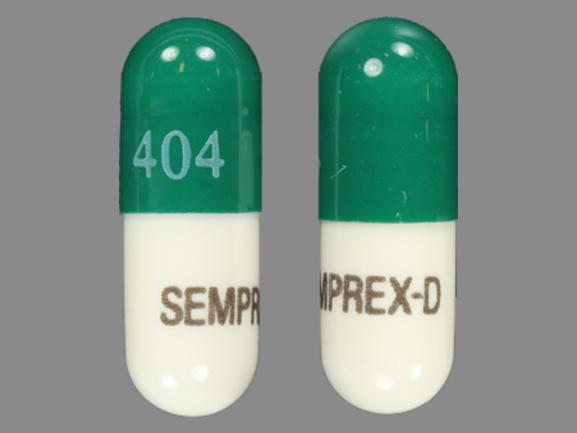Acrivastine / Pseudoephedrine Dosage
Applies to the following strengths: 8 mg-60 mg
Usual Adult Dose for:
Usual Pediatric Dose for:
Additional dosage information:
Usual Adult Dose for Allergic Rhinitis
1 capsule orally every 4 to 6 hours
Maximum dosing frequency: 4 times a day
Comments:
- Use when both antihistaminic activity and nasal decongestant activity are desired.
- Efficacy beyond 14 days of continuous treatment has not been studied.
Use(s): Relief of symptoms associated with seasonal allergic rhinitis such as sneezing, rhinorrhea, pruritus, lacrimation, and nasal congestion
Usual Adult Dose for Nasal Congestion
1 capsule orally every 4 to 6 hours
Maximum dosing frequency: 4 times a day
Comments:
- Use when both antihistaminic activity and nasal decongestant activity are desired.
- Efficacy beyond 14 days of continuous treatment has not been studied.
Use(s): Relief of symptoms associated with seasonal allergic rhinitis such as sneezing, rhinorrhea, pruritus, lacrimation, and nasal congestion
Usual Pediatric Dose for Allergic Rhinitis
12 years and older:
1 capsule orally every 4 to 6 hours
Maximum dosing frequency: 4 times a day
Comments:
- Use when both antihistaminic activity and nasal decongestant activity are desired.
- Efficacy beyond 14 days of continuous treatment has not been studied.
Use(s): Relief of symptoms associated with seasonal allergic rhinitis such as sneezing, rhinorrhea, pruritus, lacrimation, and nasal congestion
Usual Pediatric Dose for Nasal Congestion
12 years and older:
1 capsule orally every 4 to 6 hours
Maximum dosing frequency: 4 times a day
Comments:
- Use when both antihistaminic activity and nasal decongestant activity are desired.
- Efficacy beyond 14 days of continuous treatment has not been studied.
Use(s): Relief of symptoms associated with seasonal allergic rhinitis such as sneezing, rhinorrhea, pruritus, lacrimation, and nasal congestion
Renal Dose Adjustments
Not recommended.
- Both active ingredients are primarily renally excreted and therefore accumulate in patients with impaired renal function.
- Use is not recommended in renal impairment (creatinine clearance 48 mL/min or less).
Liver Dose Adjustments
Data not available
Precautions
CONTRAINDICATIONS:
- Hypersensitivity to any of the ingredients
- Hypersensitivity to other alkylamine antihistamines (e.g. triprolidine) or other sympathomimetic amines (e.g. phenylpropanolamine)
- Severe hypertension
- Severe coronary artery disease
- Concomitant MAO inhibitors and for 14 days after stopping an MAO inhibitor
Safety and efficacy have not been established in patients younger than 12 years.
Consult WARNINGS section for additional precautions.
Dialysis
No adjustment recommended.
- The total body load removed by dialysis is about 20%; 27% for acrivastine and 38% for pseudoephedrine.
- A supplemental dose after dialysis is not required.
Other Comments
Patient advice:
- Advise patients to take this drug only as prescribed and not to exceed the prescribed dose.
- This medication should only be used during pregnancy or lactation if the benefits outweigh the risks.
- Do not take this medication if the patient is on a MAO inhibitor or has stopped a MAO inhibitor less than 14 days prior as there is a risk of hypertensive crisis.
- Patients should assess their reaction to this medication before driving or operating machinery.
- Avoid use with alcohol or CNS depressants as this may cause additional reductions in alertness and impairment of CNS performance.
More about acrivastine / pseudoephedrine
- Check interactions
- Compare alternatives
- Reviews (11)
- Side effects
- During pregnancy
- Drug class: upper respiratory combinations
Patient resources
Other brands
Professional resources
Other brands
Related treatment guides
See also:
Further information
Always consult your healthcare provider to ensure the information displayed on this page applies to your personal circumstances.


